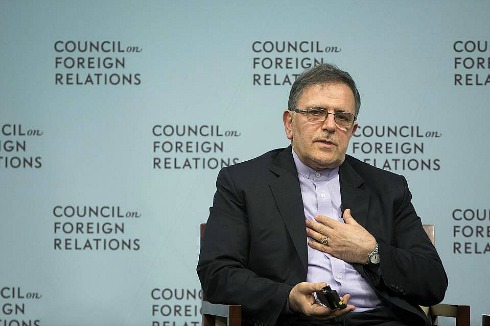Archives
AND MORE...

Opening The Floodgates
_____________________

Welcome To Missile Town
_____________________

The Deal That Keeps A-Changin'
_____________________

Surprise, Surprise
_____________________
April 19, 2016
Chutzpah, Iranian-Style
The head of Iran's central bank, Valiollah Seif, said in a speech Friday that failure to do more to integrate Iranian banks into the global economy could jeopardize the Iran nuclear deal (see below).
"In general, we are not able to use our frozen funds abroad," Seif said at the Council on Foreign Relations. "They (Iran's partners) have not honored their obligations." He added that the onus is on Washington and its allies to reassure banks that doing business in Iran is fine.
And all this as Iran continues with its ballistic missile program, efforts to sponsor terrorism throughout the world, and causing mayhem in Iraq, Syria, Yemen, Lebanon and Gaza; not to mention its abysmal human rights record and persecution of religious minorities, and rampant corruption.
But Seif dismissed these concerns. "If, according to our partners, it is our conduct which prevents international banks from engaging in business with us, they were fully aware of our conduct before signing. ... We have not changed."
So the Iranians think the US should accommodate them beyond the nuclear deal, including access to the US financial system and the ability to change into dollars foreign currency transactions through U.S.-based banks, and they find it puzzling that banks and businesses are wary of doing business with them.
So here's an idea: How about the Iranians return the BILLIONS of dollars to which the US has given them access, and we call it a day with the cockamamie Iran Deal?
Wall Street Journal | April 18, 2016
Where Iran's Complaint About Banking Integration Misses the Mark
By Matthew Levitt

Valiollah Seif, governor of Iran's central bank, at the Council on Foreign Relations in Washington on April 15. Photo: Drew Angerer/Bloomberg News
The governor of Iran’s central bank warned last week that failure to do more to integrate Iranian banks into the global economy could jeopardize the international agreement over Tehran’s nuclear program. The onus is on Washington and its allies to reassure banks that doing business in Iran is fine, Valiollah Seif said in a speech Friday at the Council on Foreign Relations. He said tellingly little about Iran’s efforts to change an environment businesses are wary of investing in, underscoring the discrepancy between Iran’s view of the nuclear deal and other international perceptions.
Mr. Seif complained that “almost nothing” has been done to reintegrate Iran into the global economy since implementation of the deal was announced in January. “Unless serious efforts are made by our partners,” he said, “in my view, they have not honored their obligations.”
Treasury official Adam Szubin said on Wednesday that Washington is not standing in the way of permissible business activities involving Iran. Some of the reasons entities might be wary of doing business there include rampant corruption, as Transparency International has documented, and the extent to which Iran’s banking sector is out of step with international banking norms, as my Washington Institute colleague Patrick Clawson has written.
“Effective implementation of the agreement,” Mr. Seif said, must be done “in such a way that Iran’s economic and business activities will be facilitated.” Otherwise, the deal “breaks up on its own terms,” he said.
Iran seems to expect the Obama administration to provide benefits beyond those in the nuclear deal, including access to the U.S. financial system and the ability to change into dollars foreign currency transactions through U.S.-based banks. U.S. officials say that neither demand will be met.
We live in a “post-sanctions environment,” Mr. Seif said. This ignores the fact that sanctions remain in place over Iran’s efforts to sponsor terrorism; its ballistic missile program; and its human rights abuses, which include executing minors and persecuting religious minorities.
Mr. Seif appeared to dismiss concerns about those activities as old hat. “If, according to our partners, it is our conduct which prevents international banks from engaging in business with us, they were fully aware of our conduct before signing. … We have not changed.”
That Iran has not changed is at the core of its problem, but that’s not how Mr. Seif seemed to see it. Asked about the risks of unwittingly doing business with the Islamic Revolutionary Guard Corps, which is still targeted by Treasury sanctions, Mr. Seif said potential investors could engage Iranian companies that run checks to determine who they would be doing business with. The use of Iranian companies to hide the IRGC’s involvement in business activities has been documented by the Treasury Department. And using in-country third parties to perform customer due diligence is seen as high-risk by international bodies that govern banking transactions.
The bottom line is that Iran has yet to curb or stop the illicit conduct that makes it a pariah state and a financial risk. It enacted a law against terrorist financing last July, but that’s done little to calm banks’ fears because its government continues to support terrorism. Until those behaviors change, banks are likely to continue to see prohibitive reputational, regulatory, and other risks to doing business there. And the only country that can do anything about that is Iran.
Matthew Levitt directs the Stein program on counterterrorism and intelligence at the Washington Institute for Near East Policy. He was deputy assistant Treasury secretary for intelligence and analysis from 2005 to 2007.
Original article here.
Log In »
Notable Quotables
"Mr. Netanyahu is one of the most media-savvy politicians on the planet. On Friday he appeared live via video link on 'Real Time with Bill Maher,' taking the host’s alternately sardonic and serious line of questioning with gazelle-like alacrity."
~ Anthony Grant, jourrnalist who has written for many major newspapers and worked in television at Paris and Tel Aviv, interviewing former PM Benjamin Netanyahu on Monday, at the outset of Mr. Netanyahu's new book (more here).


